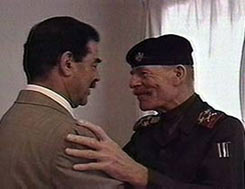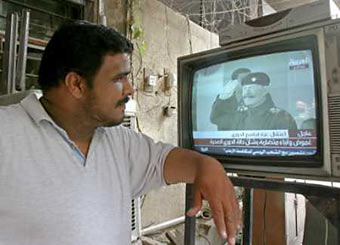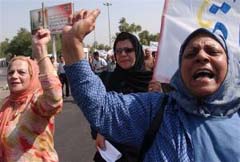|
Iraq tries to clear confusion on Saddam aide
(Agencies)
Updated: 2004-09-06 17:35
Iraq was scrambling to confirm on Monday whether the most wanted Saddam Hussein aide still on the run had been captured, after a day of government confusion with top officials making contradictory statements.

Izzat Ibrahim al-Douri, right, talks to Saddam Hussein in an undated file photograph. [CNN/File] |
An aide to Iraq Prime Minister Iyad Allawi said a man was in custody and tests were underway to confirm whether he was Izzat Ibrahim al-Douri, who was sixth on a U.S. list of the 55 most wanted members of Saddam's regime and had a $10 million price on his head. On Sunday, the Iraq Defense Ministry said Ibrahim had been seized near Tikrit, Saddam's former power base north of Baghdad.
Two ministers of state said publicly -- one at a news conference in Kuwait -- that Ibrahim had been arrested in a bloody raid in which 150 of his supporters who tried to prevent his arrest were killed or captured by Iraqi forces.
But Iraq's defense minister later denied the reports coming out of his own ministry, and the provincial National Guard commander in Tikrit said none of his men took part in any raid and he had no information on the reported arrest.

An Iraqi man watches an Arabic satellite channel, distributing news of the arrest of a man believed to Izzat Ibrahim al-Douri, in Baghdad on September 5, 2004. [Reuters] |
The U.S. military also said it had no knowledge of any operation to capture Ibrahim and he was not in U.S. custody.
And Tikrit residents said there was no sign in the area that there had been a major battle with dozens killed.
At a clinic near Tikrit where Ibrahim had reportedly been seized while seeking treatment for leukemia, medical staff said they knew nothing about such an incident.
GOVERNMENT DISARRAY

Iraqi citizens shout slogans against the rising insurgency in Iraq during a demonstration in Baghdad, Iraq, Monday Sept. 6, 2004. [AP] |
The confusion among top officials raised questions about the interim government's effectiveness and cohesion. The interim government, which took over from the U.S.-led occupation administration in June, has been struggling to contain a stubborn insurgency and to tackle a hostage crisis.
Several towns and cities in Iraq are effectively controlled by insurgents. U.S. and Iraqi forces are repeatedly targeted by guerrillas, and scores of hostages from more than two dozen countries have been seized over the last five months.
France said on Sunday it remained hopeful two French hostages would be freed, although its foreign minister returned from a Middle East mission without securing their release.
"We have serious reasons to believe both of them are in good health and that a favorable outcome is possible," Foreign Minister Michel Barnier told reporters after discussing the crisis with President Jacques Chirac.
"Our top priority today remains to secure their release. Our priority is their safety," he said. "We are working hard, calmly, cautiously and discreetly."
A statement read to reporters several hours later by a cabinet spokesman took a similar line. It said the government still believed a favorable outcome was possible and was working for the hostages' release "with confidence but great caution."
Journalists Christian Chesnot and Georges Malbrunot were seized on Aug. 20 by a militant group called the Islamic Army in Iraq, which demanded Paris rescind a law banning Muslim headscarves in state schools. France refused the demand.
Al Arabiya television reported that a Turkish truck driver held by a different group had been freed after the company that employs him pledged to stop doing business in Iraq. The Turkish government confirmed Mithat Civi had been released.
In Baghdad, several mortar rounds landed near a ministry complex in the east of the city, witnesses said. There were no immediate reports of casualties.
|